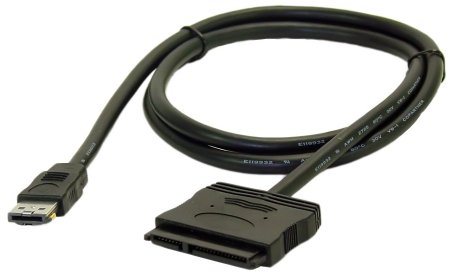time
Storage? I am Storage!
To me, the real point in USB 3.0 is a fast powered interface for portable data storage. eSATA works fine if you have an external power source, but let's face it, most people (including me) couldn't be bothered to carry around a power brick. To be genuinely useful, the interface needs to provide power for your compact removable device, whether it's flash or magnetic media.
I recently specified 2.5" USB 3.0 portable drives with a write throughput goal of at least 50MB/s. From the few reviews around, it looked like a struggle to reach that benchmark with drives such as Seagate's 5400rpm. But things looked much more promising with Samsung's 2.5" 7200rpm USB 3.0 range.
Here's NewEgg's search results for 2.5" 7200rpm USB 3.0 to give you some idea of how thin on the ground this combination is.
Incidentally, I've never seen a single spec that confirmed that the Samsung 'S2' USB 3.0 is 7200rpm, but that's what reviews and vendors are saying.
To cut to the chase, two different programs just gave me measured write performance on a 500GB Samsung USB 3.0 S2 (running under RDP). The first was a mirroring program (essentially a big file copy) and it reported 70MB/s. The second was 7-Zip and it reported >80MB/s while storing a 2GB image without compression.
Just to spell it out, that's 2GB written to a tiny (and cheap) portable 2.5" drive in less than 25 seconds.
Reads are well over 100MB/s, in case anyone's wondering.
For me, this is technology gold, i.e. something that easily exceeds my jaded expectations. This is why I am so bitterly disappointed that Samsung decided to effectively throw it all way and sell the naming rights to Seagate, who on current evidence couldn't produce something like this for 3 times the money.
I'm telling anyone who will listen to go and buy the 1TB version wherever it's available, but even the 500GB or 640GB versions are absolute bargains. There really aren't any obvious alternatives.
I recently specified 2.5" USB 3.0 portable drives with a write throughput goal of at least 50MB/s. From the few reviews around, it looked like a struggle to reach that benchmark with drives such as Seagate's 5400rpm. But things looked much more promising with Samsung's 2.5" 7200rpm USB 3.0 range.
Here's NewEgg's search results for 2.5" 7200rpm USB 3.0 to give you some idea of how thin on the ground this combination is.
Incidentally, I've never seen a single spec that confirmed that the Samsung 'S2' USB 3.0 is 7200rpm, but that's what reviews and vendors are saying.
To cut to the chase, two different programs just gave me measured write performance on a 500GB Samsung USB 3.0 S2 (running under RDP). The first was a mirroring program (essentially a big file copy) and it reported 70MB/s. The second was 7-Zip and it reported >80MB/s while storing a 2GB image without compression.
Just to spell it out, that's 2GB written to a tiny (and cheap) portable 2.5" drive in less than 25 seconds.
Reads are well over 100MB/s, in case anyone's wondering.
For me, this is technology gold, i.e. something that easily exceeds my jaded expectations. This is why I am so bitterly disappointed that Samsung decided to effectively throw it all way and sell the naming rights to Seagate, who on current evidence couldn't produce something like this for 3 times the money.
I'm telling anyone who will listen to go and buy the 1TB version wherever it's available, but even the 500GB or 640GB versions are absolute bargains. There really aren't any obvious alternatives.


